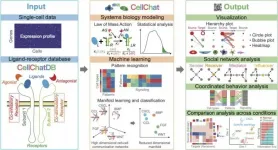(Press-News.org) The media has been rife with stories about democracy in decline: the recent coup in Myanmar, the ascent of strongman Narendra Modi in India, and of course ex-President Trump's attempts to overturn the U.S. presidential election--all of which raise alarms about the current status of democracies worldwide. Such threats to the voices of the people are often attributed to the excesses of individual leaders. But while leadership is certainly important, over the past decade, as established democracies like Venezuela and Turkey fell and others slid toward greater authoritarianism, political scientists and pundits have largely overlooked a key factor: how governments are funded. In a new study in the journal Current Anthropology, a team of anthropologists assembled data on 30 pre-modern societies, and conducted a quantitative analysis of the features and durability of "good governance"--that is, receptiveness to citizen voice, provision of goods and services, and limited concentration of wealth and power. The results showed that societies based on a broad, equitable, well-managed tax system and functioning bureaucracies were statistically more likely to have political institutions that were more open to public input and more sensitive to the well-being of the populace.
For more than a century, the accepted textbook account of democracy was that it was peculiarly modern, a purely Western phenomenon born of the "commercial restlessness" of European nations, with older agrarian/rural states viewed as static and authoritarian. However, the current crises of democratic "backsliding" have prompted a deeper dive by anthropologists and political historians into the core features, origins, and sustainability of modern democracy.
"The decline we are seeing today in many democratic governments is difficult to get a handle on," says Richard Blanton, professor emeritus at Purdue University, and the study's lead author. "In a sense, there's a fundamental tension at the heart of every democracy: the greater good versus individual self-interest. We wanted to identify the factors that motivate both leaders and citizens to maintain more egalitarian systems, given the potential of power to corrupt. As archaeologists, we know that the past always has lessons for the present." Blanton and his co-authors assembled data on 30 pre-modern societies, broke them down into numerically coded variables, and generated statistically significant scores for "good government" measures--public goods (like transportation infrastructure, wider access to water, and food security), bureaucratization (citizen voice, equitable taxation, official accountability), and controls over authorities (impeachment ability, limits on leaders' control of resources, institutions that checked each other's clout). The researchers, including Gary Feinman of the Field Museum in Chicago, Lane Fargher of the Instituto Politécnico Nacional-Unidad in Mérida, Mexico, and Stephen Kowalewski of the University of Georgia, were initially surprised by the results. The case studies covered thousands of years of human history and spanned the globe, from the Venetian Republic (1290 to 1600) to the early-mid Ming Dynasty (15th century) to the Asante Kingdom in West Africa (1800 to 1873), but despite the great diversity of geographical, cultural, historical, and social contexts, there was a positive correlation between the three metrics. Capable bureaucracies, public goods, and limits on rulers tended to occur together in relatively good governments, and were largely absent in more autocratic regimes. As Blanton says, "although what we call good governments were not common--only 27% of our examples had relatively high scores--it's clear that it is both a global and trans-historical social process that existed well before Western history and influence." This unexpected finding led the authors to reconsider the broader and causal factors that shape democracy.
Today we tend to equate democracy with elections, but electoral democracies are a fairly recent phenomenon. They are not the only way to assess the voice of citizens, and elections alone are not sufficient to ensure the public's voice in government, or that personal power of leaders is checked. "The key elements of democracies are not elections themselves," says the Field Museum's Gary Feinman, "but rather features like the rule of law, checks and balances on official power, and tools to assess the will of the governed."
Economics are key, the authors argue. Evidence overwhelmingly demonstrates that authoritarian regimes have broad discretion over a nation's wealth, for both personal and political gain. In the study's more authoritarian examples, there were few limits on self-serving leaders, and little incentive to ensure equitable distribution of public goods, or to monitor government administration. "It's no coincidence that the legend of Robin Hood arose in 14th century England," says Feinman, "where our coding identified ill-conceived and oppressive taxing schemes that diverted wealth into private hands." Conversely, the statistical models show that the more democratic systems were marked by broadly based tax revenues, which were responsibly managed by governments. In short, taxpayers generally comply if they see that the government is meeting expectations, and government authorities are incentivized to ensure that revenues will be used for the public good, and not for private gain.
In the United States, these realities were recognized during the founding of our country and that has contributed to the relative longevity of our democracy, Feinman observes. "James Madison put checks and balances in the Constitution because the Founders knew they could not rely on the virtue of leaders alone. One of the key changes in transforming the Articles of Confederation into the Constitution was to give the federal government a stronger foundation to raise funds."
This also underlines the authors' point that leaders, whether virtuous or selfish, are less important than the economic foundations of government, provisioning of public goods/services, and the bureaucratic institutions needed for both. "Look at Iraq after Saddam Hussein," says Feinman. "You could institute voting, and power-sharing agreements, but without an equitable means of financing and provisioning, it didn't matter how much shifting of leaders occurred. The system failed." Likewise, although a majority of people in the U.S. and abroad see Donald Trump as a threat to American democracy and governance, the threats were four decades in the making, with the increasing inequity of the tax base, the devaluing of labor, the lack of infrastructure and public goods funding. "The market fundamentalism that was ushered in with President Reagan, Fed Chair Alan Greenspan, and Prime Minister Margaret Thatcher during the 1980s encouraged people to pursue financial self-interest with no restraint or regulation. Cutting taxes on the wealthy and starving government undermines democracy," says Feinman.
Like modern democracies, good governments have always been fragile and hard to maintain. Across time, neither monarchies nor democracies guaranteed good governance nor excluded its possibility. Rather, the main causal factor was the way that governance was fiscally funded. Above all, the authors of this article emphasize that politics and economics cannot be decoupled in understanding government quality. Nor can we assess by ideologies alone. Rather, we must look at the practice of governance and how it affects people. "Functioning bureaucracy and broad-based, equitable taxation are not stumbling blocks to good governance, as many on both the left and right have argued for years," says Blanton. "Rather, as our historical analysis illustrates, they are key legs of the stool."
For modern-day America and other faltering democracies, the implication is that the global turn toward market fundamentalism 40 years ago, which included reduced taxation rates and lowered values on labor, is likely a key cause of democratic backsliding over the same era. As Feinman notes, "in 1936 Franklin Delano Roosevelt said that 'political equality... [is] meaningless in the face of economic inequality.' But in fact, extreme economic inequality and the monopolization of resources required to fund government may render political equality unsustainable."
INFORMATION:
When falling in love, humans often pay attention to looks. Many non-human animals also choose a sexual partner based on appearance. Male birds may sport flashy feathers to attract females, lionesses prefer lions with thicker manes and colorful male guppies with large spots attract the most females. But bats are active in the dark. How do they attract mates? Mariana Muñoz-Romo, a senior Latin American postdoctoral fellow at the Smithsonian Tropical Research Institute (STRI) and National Geographic explorer, pioneers research to understand the role of odors in bat mating behavior.
"Aside from their genitalia, most male and female bat species look identical at first glance. However, a detailed examination during mating season reveals odor-producing glands or structures that are only present ...
Gastrointestinal stromal tumors (GISTs) are a subytpe of cancers known as sarcomas. GIST is the most common type of sarcoma with approximately 5,000 to 6,000 new patient cases annually in the United States. GIST cannot be cured by drugs alone, and targeted therapies are only modestly effective, with a high rate of drug resistance. In a recent study, researchers at University of California San Diego School of Medicine identified new therapeutic targets that could lead to new treatment options for patients.
The study, published in the February 18, 2021 online edition of Oncogene, found that specific cell-to-cell communication influences GIST biology and is strongly associated with cancer ...
A recent study by University of Alberta cardiologists at the Canadian VIGOUR Centre shows that a particular group of patients with stable ischemic heart disease have better outcomes with percutaneous coronary intervention (also called angioplasty with stent) or coronary artery bypass surgery and medication, versus conservative management with medication alone.
In a study published in the Journal of the American Heart Association, associate professor of medicine and academic interventional cardiologist Kevin Bainey and his team reviewed the patient information of more than 9,000 Albertans with stable ischemic heart disease. While able to function as outpatients, ...
FAYETTEVILLE, Ark. -Variation in a specific gene could be related to traits that are beneficial to bonding and relationship satisfaction in the first years of a marriage, according to a new study by a University of Arkansas psychologist.
Recent research indicates that a variation called "CC" in the gene CD38 is associated with increased levels of gratitude. Extending that line of work, U of A psychologist Anastasia Makhanova and her colleagues used data from a study of genotyped newlyweds to explore whether a correlation existed between the CD38 CC variation and levels of trust, forgiveness and marriage satisfaction. They found that individuals with the CC variation did report higher levels of perceptions considered beneficial to successful relationships, particularly trust.
Marriage ...
Some songbirds are not dissuaded by constant, loud noise emitted by natural gas pipeline compressors and will establish nests nearby. The number of eggs they lay is unaffected by the din, but their reproductive success ultimately is diminished.
That's the conclusion of a team of Penn State researchers who conducted an innovative, elaborate study that included unceasing playback of recorded compressor noise, 80 new, never-before-used nest boxes occupied by Eastern bluebirds and tree swallows, and behavioral observations with video cameras placed within boxes.
Importantly, the birds did not preferentially select quiet boxes over noisy boxes, suggesting they do not recognize the reduction ...
Irvine, Calif. -- An interdisciplinary team of biologists and mathematicians at the University of California, Irvine has developed a new tool to help decipher the language cells use to communicate with one another.
In a paper published today in Nature Communications, the researchers introduce CellChat, a computational platform that enables the decoding of signaling molecules that transmit information and commands between the cells that come together to form biological tissues and even entire organs.
"To properly understand why cells do certain things, and to predict their future actions, we need to be able to listen ...
Law enforcement and those in the military, rather than doctors and celebrities, are the most preferred messengers on firearm safety, a Rutgers study found.
The findings, published in the journal Preventive Medicine, can help communicate the importance of safe firearm storage and reduce the rate of suicides, Rutgers researchers say.
"We know that safe firearm storage is a key component to suicide prevention, but that belief is not widespread among firearm owners," said lead author Michael Anestis, executive director of the New Jersey Gun Violence Research Center and an associate professor of Urban-Global Public Health at Rutgers School ...
A research team including the geobiologist Dr. Helge Missbach from the University of Cologne has detected organic molecules and gases trapped in 3.5 billion-year-old rocks. A widely accepted hypothesis says that the earliest life forms used small organic molecules as building materials and energy sources. However, the existence of such components in early habitats on Earth was as yet unproven. The current study, published in the journal 'Nature Communications', now shows that solutions from archaic hydrothermal vents contained essential components that formed a basis for the earliest life on our planet.
Specifically, the scientists examined about ...
Weighing in at roughly 21 solar masses, the black hole in the X-ray binary system Cygnus X-1 is so massive that it challenges current stellar evolution models, a new study reveals. Ultimately, the mass of a black hole is determined by its parent star's properties and is generally constrained by the mass lost to stellar winds throughout its lifetime. If a black hole interacts with a binary companion star, the system emits X-rays and can sometimes form radio jets, which make the systems visible to electromagnetic observations as an X-ray binary. Measurements from known x-ray binaries have shown that black holes in these systems all have masses below 20 solar masses (M?), with the largest being 15-17 M?. However, gravitational wave detections of black hole merger events have found ...
Nearly 42,000 years ago, when Earth's magnetic fields reversed, this triggered major environmental changes, extinction events, and long-term changes in human behavior, a new study reports. The findings, made possible by a new radiocarbon record derived from New Zealand's ancient kauri trees, raise important questions about the evolutionary impacts of geomagnetic reversals and excursions throughout the deeper geological record, the authors say. "Before this work," says author Chris Turney in a related video, "we knew there were a lot of things happening around the world at 42,000 years ago, but we didn't know precisely how... For the first time, we've been able to precisely date what happened when Earth's magnetic fields last flipped." Written in the geological ...







